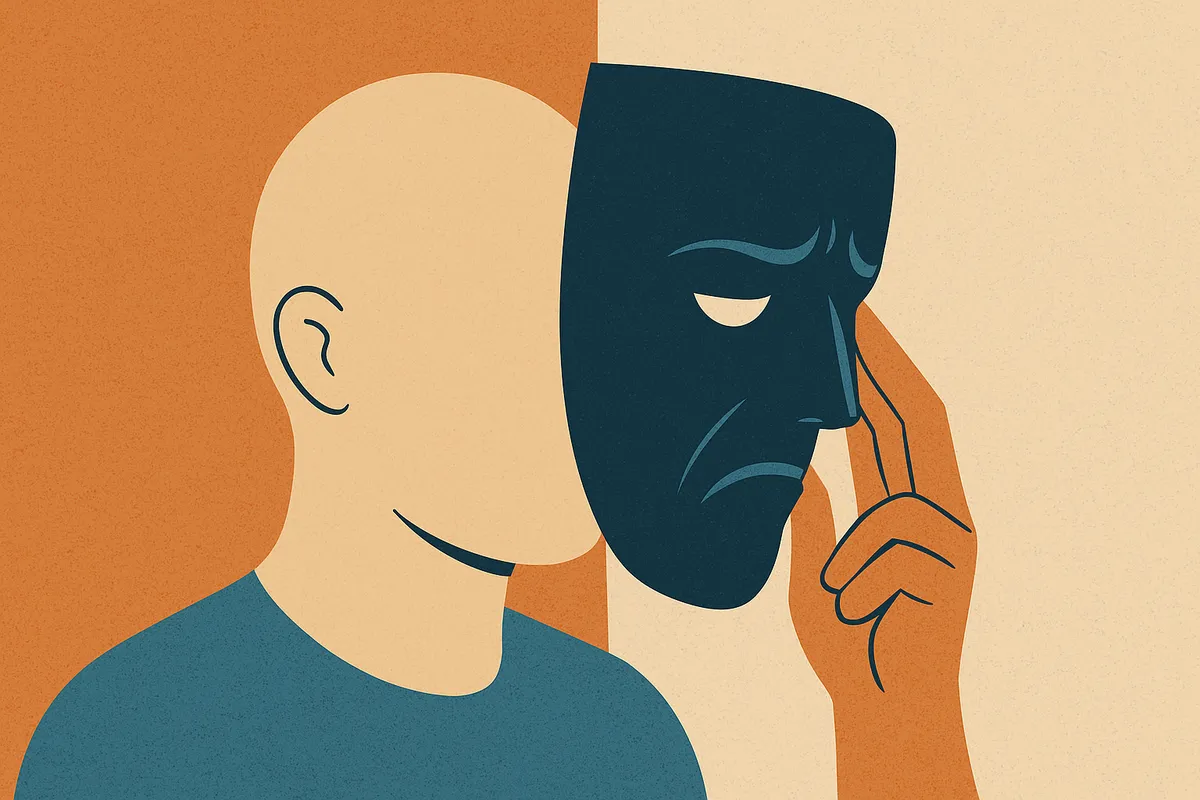When the Mask Eats the Self
 Not Just Tired, But Shaken
Not Just Tired, But Shaken
Masking has long been described as exhausting. Autistic adults report it drains energy, fuels burnout and corrodes mental health. But a new study by Taylor Burns and Monique Botha ("Who Am I: The Balance Between Masking and Identity", Autism in Adulthood, 2025) argues the cost is deeper: masking disrupts the very process of identity formation. The researchers found that for autistic people, the pathway from masking to psychological distress runs entirely through identity distress. In short: it’s not only the act of hiding that hurts, but what hiding does to your sense of who you are.
Identity as the Missing Variable
The study compared 139 autistic adults and 133 non-autistic adults. Both groups completed surveys on masking behaviors, identity distress, identity conflict and psychological distress. Results were stark:
- 46% of autistic participants met the clinical threshold for severe identity distress, compared to 13% of non-autistic participants.
- 88% of autistic participants scored above the threshold for high levels of masking.
- 84% of autistic participants met the cutoff for severe psychological distress, double the non-autistic rate.
For autistic participants, masking’s impact on mental health disappeared once identity distress was factored in. In other words, masking damages well-being precisely because it destabilizes identity. For non-autistic participants, the pattern was different: masking and identity distress each contributed separately to mental health. Impression management for them is situational. For us, it is structural.
Who Benefits When the Self Fractures?
The study highlights the role of neuro-normativity — the assumption that neurotypical behaviors define what is “normal.” Autistic adults mask to survive in environments designed around these norms. The short-term benefit is protection from stigma, bullying or exclusion. But the long-term cost is internal: blurred identity, fractured authenticity and mounting distress. The beneficiaries are not autistic people but the systems that demand compliance and erase difference.
What Identity Distress Looks Like
Identity distress shows up as uncertainty or discomfort across personal and social domains: friendships, career goals, values and self-image. Autistic participants reported greater conflict between “who I am” and “who society wants me to be.” One participant put it bluntly in an earlier qualitative study: “I’m so good at masking, I can’t tell what’s mask and what’s me.” Burns & Botha confirm this isn’t an isolated feeling but a widespread pattern with measurable mental health costs.
Methods That Matter
The researchers didn’t just run statistics; they built the study with autistic input. A lay autistic consultant helped refine survey language and broaden gender and sexuality options. Both self-identified and formally diagnosed autistic participants were included — and showed no significant differences in distress or masking. That choice matters. It resists the policing of identity and validates self-knowledge as legitimate data.
Beyond Symptom Reduction
What happens if we stop treating masking as a clinical curiosity and start recognizing it as an identity issue? This study suggests that interventions focused on “reducing autistic traits” miss the point. Mental health support that centers identity cohesion — the ability to feel whole across contexts — may prove far more protective. Future research should explore intersectionality, belonging and the link between disrupted identity and suicidality.
The Unresolved Question
If masking is survival, and survival comes at the price of selfhood, then the real question isn’t how to make autistic people more resilient. It’s how to build a world where authenticity isn’t punished. Tragically, the world in which we live is not set up for autistic people so the days that no longer require masking will not arrive anytime soon. Until then, masking will remain both necessary for acceptance and dangerous for identity — a double-bind the study makes impossible to ignore.